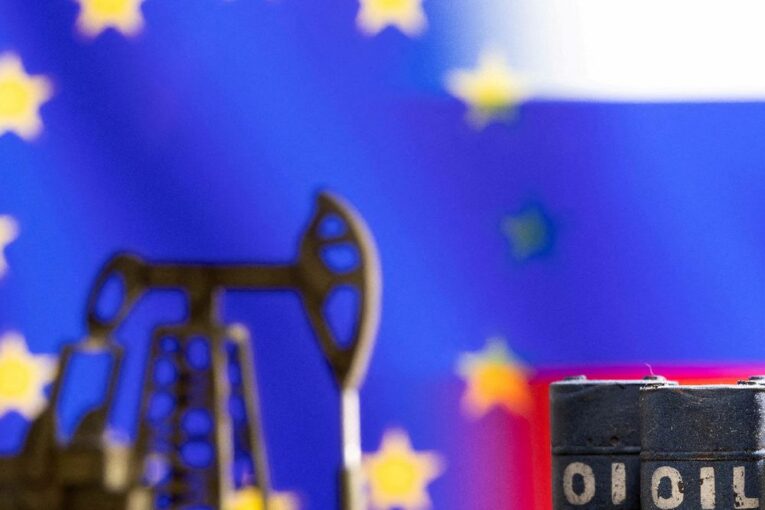
Russia cut off the gas to more European buyers, stepping up its use of energy as a weapon and sowing further division in Europe.
Gazprom PJSC halted pipeline shipments to the Netherlands and Denmark this week, and then surprised markets by also cutting off a small contract supplying Germany.
Shell Plc and wind giant Orsted A/S had refused to comply with President Vladimir Putin’s demand for payments to be made in rubles, and Gazprom responded by halting flows.
Russia is keeping its grip on the European Union’s gas market just as the bloc moved to impose its harshest energy sanctions so far in response to the invasion of Ukraine.
European Union leaders agreed to pursue a ban that would halt the imports of most Russian oil, in a move designed to hit the country’s coffers and pave the way for a sixth package of sanctions to punish it and President Vladimir Putin for the invasion of Ukraine.
Oil headed for the longest run of monthly gains in more than a decade on the EU’s move that was reached during a leaders’ summit in Brussels. Members overcame objections from Hungary, which had been blocking an embargo as it sought assurances its energy supplies wouldn’t be disrupted.
For months, Moscow has been sowing division in Europe over gas, a resource the continent can’t live without, by demanding payments in rubles.
Some countries stood firm, refused to engage with the new terms that risked breaching the bloc’s own sanctions, and saw their gas cut off. Poland and Bulgaria were the first to go.
Elsewhere, companies such as Italy’s Eni SpA and Germany’s Uniper SE instead scrambled to find a way to satisfy Putin’s demands without falling foul of sanctions. Their gas is uninterrupted.
Italian Prime Minister Mario Draghi said on Tuesday that Russia is treating individual countries differently. But a person familiar with Gazprom’s contracts told Bloomberg that the bloc’s top buyers have paid according to the new terms, and that after Shell and Orsted, no more companies will get cut off.
Treatment by Russia
After weeks of wrangling over the terms, the pattern has emerged that major buyers of Russian gas found a way to keep paying, while smaller buyers with more alternatives — and in some cases a more hawkish approach to Moscow — refused to cave.“This is clearly important but contracts with the majority of these buyers were either terminating this year anyway or are for relatively small volumes,” said Jonathan Stern, a distinguished research fellow at the Oxford Institute for Energy Studies. “The decisions of these buyers have not — yet — impacted the majority of Russian gas exports to Europe under long term contracts.”
The Danish cut comes just as the nation is set to vote onWednesday on the EU military pact, a referendum the government has called in response to the Ukraine invasion. Polls suggest the country, which has traditionally shunned deeper EU integration, will join and thereby move closer to the bloc.
Likewise, Finland saw its power exports from Russia cut two days after the its leaders said they would back an application to join NATO, and gas flows ended three days after it submitted its application.
Gazprom’s export arm said it’s stopping sending gas to Shell Energy Europe, impacting supplies to Germany — effective Wednesday. The Russian gas giant is also cutting off Denmark’s Orsted on Wednesday and Dutch energy firm GasTerra BV on Tuesday.
Shell Energy Europe has a contract with Gazprom for gas supplies to Germany of as much as 1.2 billion cubic meters a year, according to the Russian exporter.
That’s less than 0.8 per cent of what the Russian company supplied to the European Union last year. Germany’s biggest gas buyer is Uniper, which continues to receive Russian gas.
Orsted’s long-term contract is for 20 terawatt-hours a year, or about 1.9 billion cubic meters a year. While that’s just a fraction of EU’s gas imports, it accounts for more than 80 per cent of the 24 terawatt-hours Denmark imported last year.
You can read more of the news on source
